US election: Hillary's humiliating low road to White House
- Published
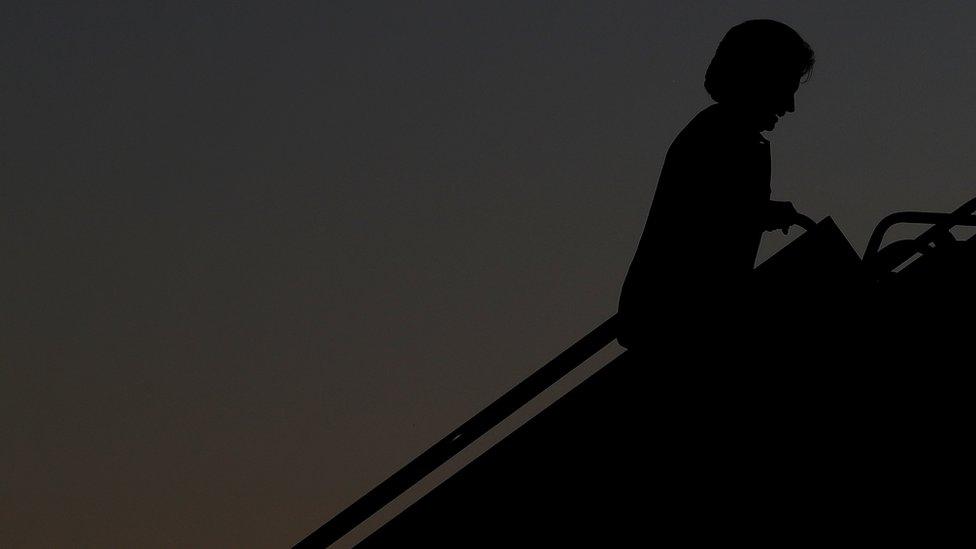
Hillary Clinton could be days away from earning the most powerful job in the land. But the road to the White House has been a rough one.
Her journey in these final days has taken her across this vast continent, and travelling with Hillary Clinton, on her plane and in her motorcade, I have got to see the view from her window.
Of the snarling faces of pro-Trump protesters, some dressed in prison fatigues, some waving the Confederate flag, as she arrived for a rally in the Florida countryside.
Of a golden skyscraper emblazoned with the name of her rival, TRUMP, as we drove past The Strip in Las Vegas.
Of the floodlit faces of supporters at a night-time, open-air rally in Fort Lauderdale, where a Trump protester lurked in the crowd with a placard he had smuggled in: "Bill Clinton is a rapist."
Her road to the White House has been lined with anger, hatred and mistrust. And surely it must sometimes be painful to peer through the tinted glass of her armoured SUV to see demonstrators who would rather see her in jail. From bullets those vehicles offer a protective shell, but not the brickbats.
Only two weeks ago, with Donald Trump reeling from the release of the Access Hollywood tape and mercilessly lampooned by Saturday Night Live for his self-satirising performances in the televised debates, these concluding miles looked like they were becoming a victory lap.
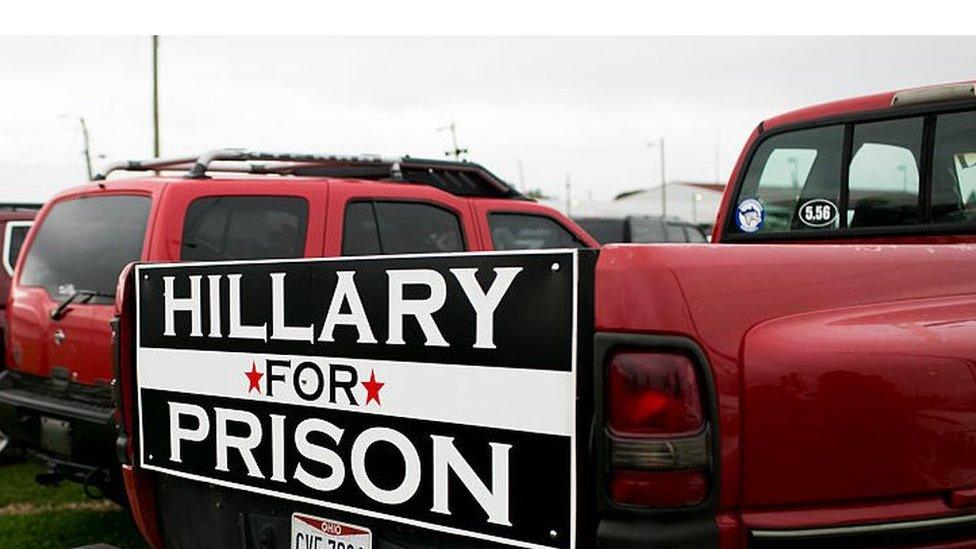
Though America is too polarised these days to produce 1964-style landslides, it looked like she was on course for a lop-sided victory in the Electoral College. Arizona, a red state that has only once gone Democrat since 1948, was thought to be leaning Democrat. Even Texas, one of the Republican's most bankable states, was said to be in play.
Then came that October surprise on steroids, as Fox News described the FBI's announcement that it was reviewing emails found on the laptop used by her closest aide Huma Abedin and Anthony Weiner, the disgraced former Congressman.
The aura of inevitability projected by her campaign was quickly replaced by a palpable sense of vulnerability.
The polls were tightening. Some showed Trump had pulled ahead. In early voting, African-Americans were not turning out in high enough numbers. Florida, the most important battleground state, was now a toss-up.
The conjecture inside the Hillary bubble about who would occupy senior posts in her administration ended abruptly. Abedin, her constant companion and so-called "second daughter", was now absent from her side.
After a few days, we didn't even bother craning our necks to look to see if she was boarding the campaign plane. It was now a given that she wouldn't be there.
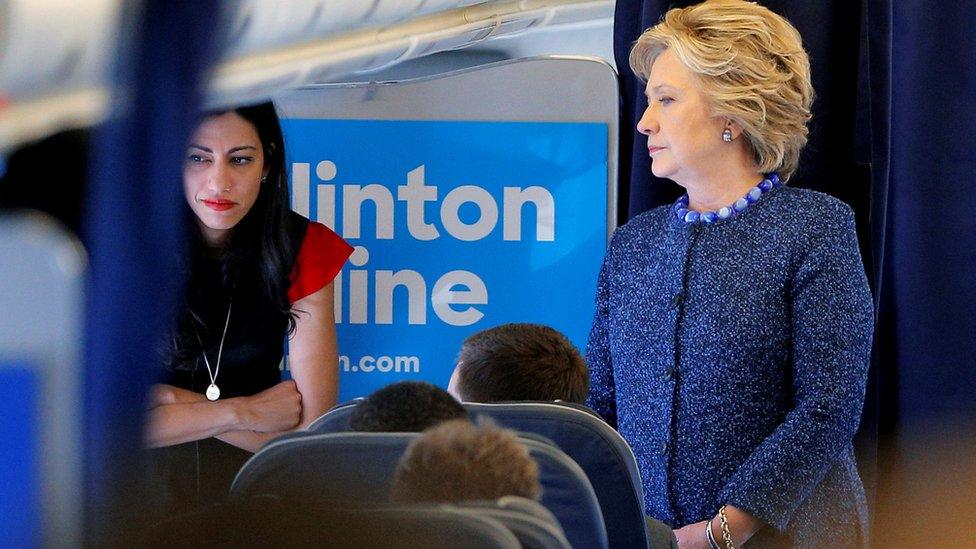
Huma Abedin and Hillary Clinton listen to staff members on the campaign plane on 28 October
Rather than ending on high-minded appeals for national unity, the plan when she enjoyed double-digits leads in the polls, Hillary Clinton has been forced to re-litigate the case against Donald Trump.
Rather than outlining her vision for the nation, she has sounded like a prosecutor making a desperate closing argument in a scrappy and sordid trial that the jury can't wait to end.
What's been striking about her stump speeches in these final days is their tone of exasperation.
As she recites again her curriculum vitae - those years fighting for children as a lawyer, her tenure as First Lady, her time in the Senate co-sponsoring bipartisan legislation, those 112 countries she visited as Secretary of State, it is as if she cannot believe that the world's most important job interview could end with someone so manifestly unqualified being appointed.
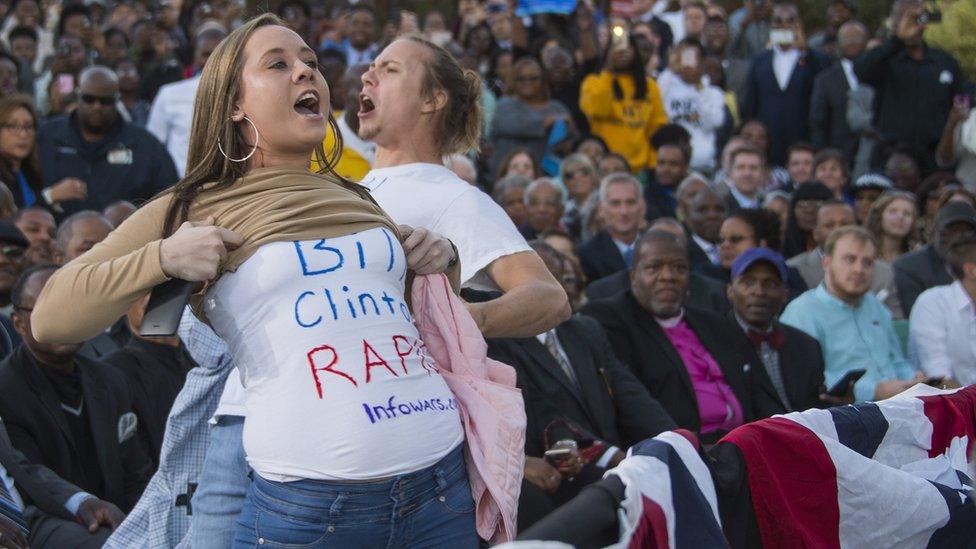
Demonstrators wearing shirts reading 'Bill Clinton Rapist' at campaign event in North Carolina
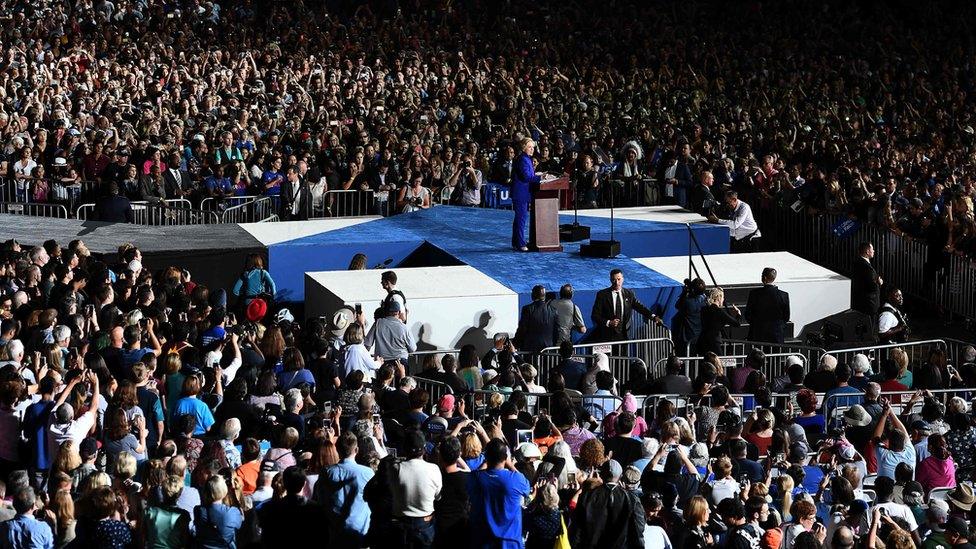
A man, she repeatedly reminds audiences, who was presenting Celebrity Apprentice on the night that she was hunkered in the Situation Room watching the mission that killed Osama Bin Laden.
Nor can she seem to fully process the idea that this polyglot nation, in which millions more women will vote than men, could seriously entertain the idea of electing a candidate whose name has become synonymous with xenophobia and misogyny.
The unspoken line of these final days speeches is: How did it ever come to this?
It is as if she has walked onto the set of the wrong movie. Or, more aptly, the set of the wrong daytime show: Jerry Springer or Judge Judy rather than Oprah or Ellen.

More from the BBC
Columnist Joe Klein gives an insider's take on the real Hillary Clinton

Surely, she could never have imagined that at a campaign stop in Florida, she would be introduced by a former Miss Universe, Alicia Machado - there to remind women voters that Donald Trump has called her Miss Piggy.
Nor would she have predicted that at a rally in North Carolina she would have to call on Bernie Sanders, a proud socialist and septuagenarian, who managed this year to enthuse young female voters in ways that she struggled to do so.
Surely it must be wounding to be so dependent on the star power of Michelle Obama. And also to rely so heavily on Barack Obama, not only to act as her campaigner-in-chief, but more importantly her character witness-in-chief.
As campaigns reach their climax, it is customary for presidential candidates to reflect on how seeking the highest office in the land has been a humbling experience.
Clinton's not-so-secret weapon in Arizona: Michelle Obama
But there must have been times when Hillary Clinton has also found it deeply humiliating.
To peer out of the window in these final days, with the country flashing by, is to have been reminded of what can be awe-inspiring about America. Flying into Las Vegas, we looked down on the Hoover Dam, that great monument to American ingenuity.
We have travelled to its university campuses, those academic powerhouses that have helped make America great.
From the palm-lined beaches of southern Florida to the copper-tinted mountains on the fringes of Phoenix, we have witnessed its epic beauty. But the end of this campaign, like so much that has gone before, has been unlovely and unedifying.
In these final days, it has felt like we have been travelling along a low road to the White House.